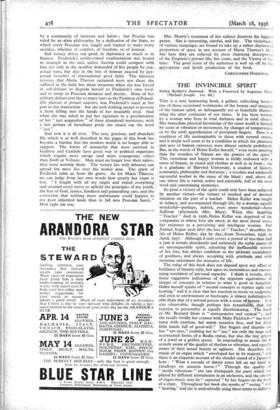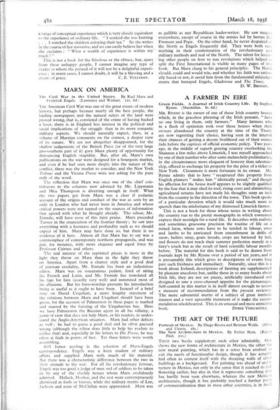'I'VE INVINCIBLE SPIRIT
Helen Keller's Journal. With a Foreword by Augustus Muir. (Michael Joseph. Kos. 6d.) Tins is a very heartening book, a gallant, refreshing book— one of those occasional testimonies of the beauty and integrity of the human spirit, so infrequently yet so hopefully illumin- ating the utter confusion of our times. It has been written by a woman who lives in total darkness and in total silence. Her immediate physical knowledge of the outer world is, limited by scent or vibration or movement, by changes of temperature, or by the swift apprehension of percipient fingers. Here is a condition of. Life unimaginable to those with normal senses, and it might well seem to be a condition in which the pleasures and uses of human existence were almost entirely prohibited. But, in the words of Helen Keller herself, " even more amazing than the wonders of Nature are the powers of the spirit." This victorious and happy woman is richly endowed with a sense of beauty, in sound and rhythm as well as in form ; she is a graduate of Harvard University, a student of history, economics, philosophy and literature ; a resolute and eminently successful worker in the cause of the blind ; and, above all, one whose life is varied, active and ,enjoyable, full of the most vivid and entertaining memories. So great a victory of the spirit could only have been achieved by another victory—the victory of method and of devoted intuition on the part of a teacher. Helen Keller was taught in infancy, and accompanied through life, by a woman equally wonderful—perhaps, indeed, _even more wonderfulAnne Sullivan (afterwards Mrs. Macy). When this inspiring " Teacher " died in 1936, Helen Keller was deprived of the companion to whose love she owed; is the most literal sense, her existence as a perceiving and intelligent woman. Her „journal, begun soon after the-loss of " Teacher," describes the life of Helen Keller, day by dayAfrom November, 1936, to April, 1937. Although it only covers a period of less than half a year it reveals abundantly and intimately the noble course of an unconquerable spirit, admitting the ineffaceable sorrow of her loss, but always confident in the ultimate ascendancy of goodness, and always accepting with gratitude and with immense enjoyment the treasures of life.
The value of this ,book does not depend upon any effect or brilliance of literary style, but upon its tremendous and encour- aging revelation of personal capacity. I think it reveals, also, many suggestive indications of the apparent equivalence of images or concepts in relation to what is good or beautiful. Helen herself speaks of " mental concepts to replace sight and hearing," and it is clear that her reaction-t9 music or sculpture, and even to environment or landscape, is almost indistinguish- able from that of a normal person with a sense ofauty. It is also observable, though perhaps less remarkal4 that her reaction to personality is equally discriminating. The hand of Mr. Bernard Shaw is " unresponsive and cynical " ; and she recalls vividly her contact with Mary Pickford—" her body tense with exertion, her warm sensitive face, and hot dirty little hands full of good-will." Her fingers and thumbs are her " ten eyes," enabling her to " see," not only the large and accentuated forms of a Rodin statue, but also the tiny graces of a jewel or a golden spoon. In responding to. music she is acutely aware of the quality of rhythm or vibration, and equally aware of their actual beauty or ugliness. She describes the music of an organ which " enveloped her in its majesty," and there is an exquisite account of the slender sound of a Japanese koto : " What a cascade of dainty notes fell on my hand as raindrops on autumn leaves ! " Through the quality of " tactile vibrations " she can distinguish the parts which are played by different instruments in an orchestra, and the chords of organ-music may be " captured " by her fingers on the back of a chair. Throughout her book she speaks of " seeing " and " hearing," and she is undoubtedly using these terms to indicate
a range of conceptual experience which is very closely equivalent to the experience of ordinary life. " I noticed she was knitting . . . I watched the children enjoying their tea." So she writes in the course of her narrative, and we can easily believe her when she exclaims : " What a wealth of experience is within my reach ! "
This is not a book for the frivolous or the obtuse, but, apart from these unhappy people, I cannot imagine any type of reader to whom the perusal of it will not be a delightful experi- ence ; in many cases, I cannot doubt, it will be a blessing and a















































 Previous page
Previous page